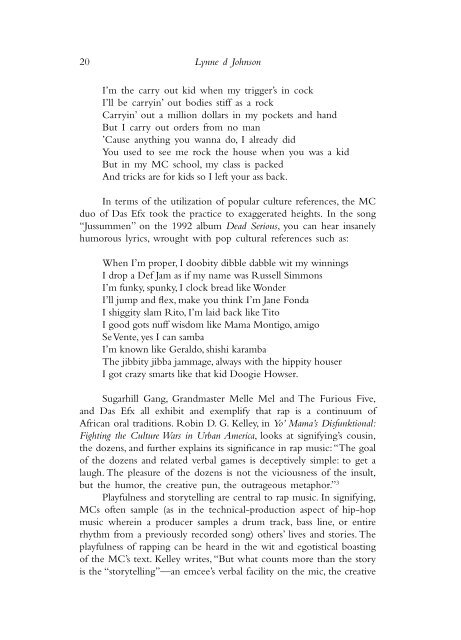You also want an ePaper? Increase the reach of your titles
YUMPU automatically turns print PDFs into web optimized ePapers that Google loves.
20 Lynne d Johnson<br />
I’m <strong>the</strong> carry out kid when my trigger’s in cock<br />
I’ll be carryin’ out bodies stiff as a rock<br />
Carryin’ out a million dollars in my pockets and hand<br />
But I carry out orders from no man<br />
’Cause anything you wanna do, I already did<br />
You used to see me rock <strong>the</strong> house when you was a kid<br />
But in my MC school, my class is packed<br />
And tricks are for kids so I left your ass back.<br />
In terms <strong>of</strong> <strong>the</strong> utilization <strong>of</strong> popular culture references, <strong>the</strong> MC<br />
duo <strong>of</strong> Das Efx took <strong>the</strong> practice to exaggerated heights. In <strong>the</strong> song<br />
“Jussummen” on <strong>the</strong> 1992 album Dead Serious, you can hear insanely<br />
humorous lyrics, wrought with pop cultural references such as:<br />
When I’m proper, I doobity dibble dabble wit my winnings<br />
I drop a Def Jam as if my name was Russell Simmons<br />
I’m funky, spunky, I clock bread like Wonder<br />
I’ll jump and flex, make you think I’m Jane Fonda<br />
I shiggity slam Rito, I’m laid back like Tito<br />
I good gots nuff wisdom like Mama Montigo, amigo<br />
Se Vente, yes I can samba<br />
I’m known like Geraldo, shishi karamba<br />
The jibbity jibba jammage, always with <strong>the</strong> hippity houser<br />
I got crazy smarts like that kid Doogie Howser.<br />
Sugarhill Gang, Grandmaster Melle Mel and The Furious Five,<br />
and Das Efx all exhibit and exemplify that rap is a continuum <strong>of</strong><br />
African oral traditions. Robin D. G. Kelley, in Yo’ Mama’s Disfunktional:<br />
Fighting <strong>the</strong> Culture Wars in Urban America, looks at signifying’s cousin,<br />
<strong>the</strong> dozens, and fur<strong>the</strong>r explains its significance in rap music: “The goal<br />
<strong>of</strong> <strong>the</strong> dozens and related verbal games is deceptively simple: to get a<br />
laugh. The pleasure <strong>of</strong> <strong>the</strong> dozens is not <strong>the</strong> viciousness <strong>of</strong> <strong>the</strong> insult,<br />
but <strong>the</strong> humor, <strong>the</strong> creative pun, <strong>the</strong> outrageous metaphor.” 3<br />
Playfulness and storytelling are central to rap music. In signifying,<br />
MCs <strong>of</strong>ten sample (as in <strong>the</strong> technical-production aspect <strong>of</strong> hip-hop<br />
music wherein a producer samples a drum track, bass line, or entire<br />
rhythm from a previously recorded song) o<strong>the</strong>rs’ lives and stories. The<br />
playfulness <strong>of</strong> rapping can be heard in <strong>the</strong> wit and egotistical boasting<br />
<strong>of</strong> <strong>the</strong> MC’s text. Kelley writes, “But what counts more than <strong>the</strong> story<br />
is <strong>the</strong> “storytelling”—an emcee’s verbal facility on <strong>the</strong> mic, <strong>the</strong> creative
















